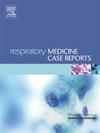抗eIF2B抗体阳性系统性硬化症患者的间质性肺病:病例报告和文献综述
IF 0.8
Q4 RESPIRATORY SYSTEM
引用次数: 0
摘要
我们报告了一例76岁的系统性硬化症男性患者,其抗真核细胞启动因子2B(eIF2B)抗体呈阳性。他因劳累时呼吸困难到我院就诊,经过全面体检,被诊断为间质性肺病伴系统性硬化症。此外,系统性硬化症患者的抗 eIF2B 抗体呈阳性。在系统性硬化症中出现抗 eIF2B 抗体非常罕见,仅占病例的 1-2.5%,而且很少有报道。与我们的病例类似,抗 eIF2B 抗体阳性的系统性硬化症患者也更容易并发间质性肺病。在此,我们将详细讨论我们的病例,并总结之前的研究结果。本文章由计算机程序翻译,如有差异,请以英文原文为准。
Interstitial lung disease in a patient with anti-eIF2B antibodies-positive systemic sclerosis: A case report and literature review
We report the case of a 76-year-old male patient with systemic sclerosis positive for anti-eukaryotic initiation factor 2B (eIF2B) antibodies. He presented to our hospital with dyspnea on exertion and, following a comprehensive physical examination, was diagnosed with interstitial lung disease associated with systemic sclerosis. Furthermore, systemic sclerosis was positive for the anti-eIF2B antibody. The presence of anti-eIF2B antibodies in systemic sclerosis is very rare, occurring in only 1–2.5 % of cases and seldom reported. Similar to our case, systemic sclerosis with positive anti-eIF2B antibodies has been reported to be more likely to be complicated by interstitial lung disease. Herein, we discuss our case in detail and summarize the previous findings.
求助全文
通过发布文献求助,成功后即可免费获取论文全文。
去求助
来源期刊

Respiratory Medicine Case Reports
RESPIRATORY SYSTEM-
CiteScore
2.10
自引率
0.00%
发文量
213
审稿时长
87 days
 求助内容:
求助内容: 应助结果提醒方式:
应助结果提醒方式:


